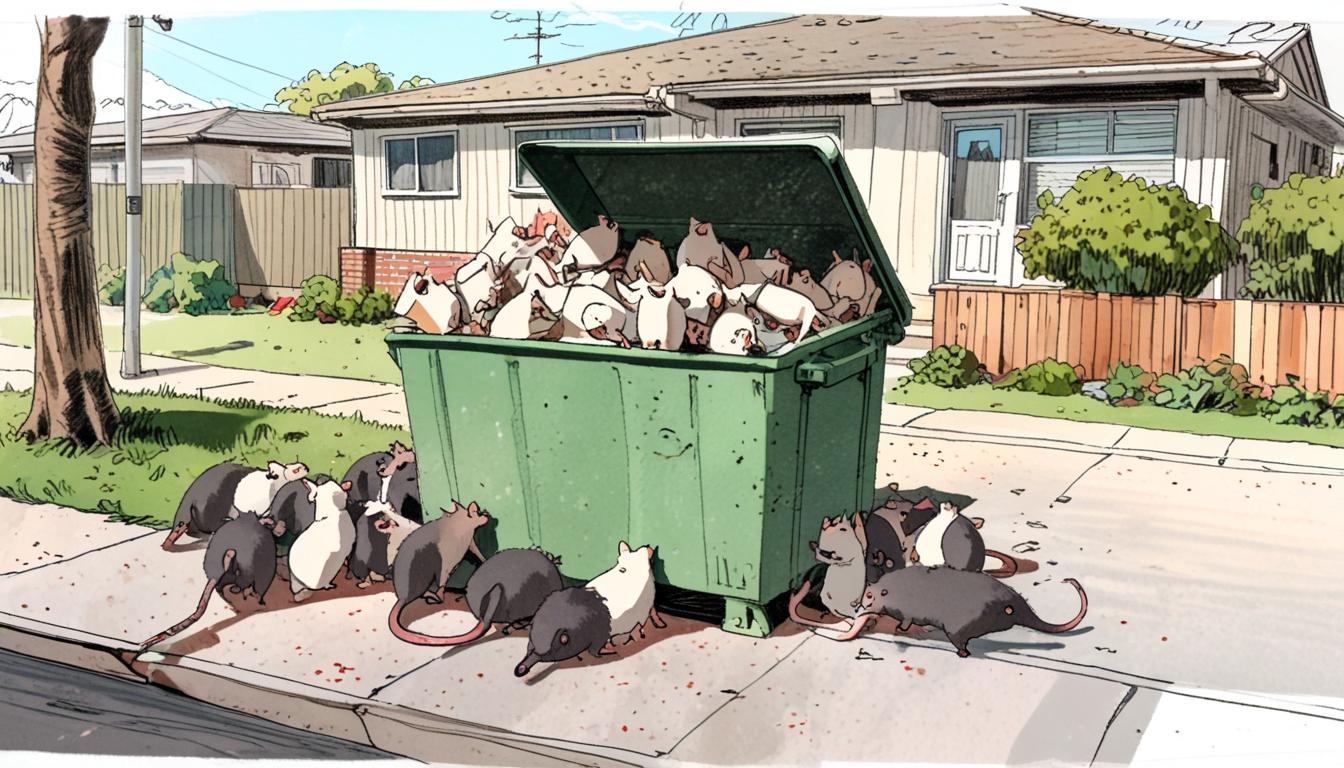Residents in Thornhill, Cardiff, express rising alarm over severe rat infestations linked to an 80-year-old hoarder’s decades-long waste accumulation, prompting council action and a criminal behaviour order after years of failed interventions.
Furious neighbours in Thornhill, Cardiff, are voicing their distress over a longtime issue with 80-year-old Glynn Cross, a self-confessed hoarder reportedly refusing to empty his bins for 25 years. Locals claim that this behaviour has led to a severe rat infestation, with sightings of oversized rodents becoming a daily concern in the neighbourhood. It is alleged that piles of rubbish, including a striking four-foot-high collection of empty milk cartons, have turned Mr Cross’s three-bedroom bungalow into a source of frustration and fear for those living nearby.
Recent legal proceedings confirmed the local council’s determination to address the unacceptable conditions surrounding Mr Cross’s residence. Following a court appearance, he was fined £100 and issued a criminal behaviour order, enabling council officials to forcibly enter his property to undertake necessary clean-up work. Councillor Norma Mackie, who oversees Shared Regulatory Services for Cardiff council, stated that the ongoing situation has caused “unnecessary suffering” to neighbours and noted multiple attempts to assist Mr Cross in clearing his home had been met with resistance.
Concerns over hoarding are not unique to Mr Cross. Numerous cases across the UK highlight a growing public health issue related to waste accumulation and vermin. For instance, in Kinmel Bay, brothers were fined for creating a toxic environment by hoarding 120 tonnes of rubbish, which led to a significant rat problem for local residents. Their predicament resulted in the council spending £59,000 on cleanup and deploying over 165 rat traps, illustrating the severity of such situations and the resource strain they can impose on municipal services.
The community’s concern reflects a deep frustration not just with Mr Cross’s habits but with the implications for public health and safety. George Davis, one of the affected neighbours, shared that the stress caused by the infestation has made his wife ill; she has experienced numerous medical episodes linked to the anxiety of living next door to Mr Cross. Other residents have reported seeing rats behaving aggressively, and one neighbour recounted a particularly alarming instance where she witnessed a rat giving birth outside her window during dinner time. Such vivid details underscore the urgent need for resolution.
Hoarding behaviors often stem from complex psychological issues, and while empathy for Mr Cross’s situation has been expressed, neighbours feel increasingly justified in their frustration. They argue that understanding should not exempt individuals from their responsibilities toward communal living. “I feel sorry for the man, I really do,” noted one resident, “but he just has to clear everything out.” This sentiment reflects a growing awareness of how hoarding can disrupt entire neighbourhoods.
Despite the council’s intervention, there is still uncertainty about whether Mr Cross will comply with the cleanup order voluntarily or if further actions, including forcible entry by officials, will be necessary. Council officials hope for cooperation from Mr Cross, aiming to restore a healthy living environment for all residents. Meanwhile, the community anxiously awaits both the resolution of this distressing saga and the re-establishment of their once-peaceful neighbourhood dynamic.
As local authorities grapple with the complexities of hoarding cases, the Thornhill situation serves as a poignant reminder of the broader implications of individual actions on collective well-being, highlighting the need for effective support systems for individuals while ensuring community standards are upheld.
Reference Map
- Paragraphs 1, 2, 5, 6, 7
- Paragraphs 3, 4
- Paragraph 4
Source: Noah Wire Services
- https://www.dailymail.co.uk/news/article-14695627/Furious-neighbours-claim-hoarder-door-refused-bins-25-YEARS-causing-infestation-two-foot-rats-homes.html?ns_mchannel=rss&ns_campaign=1490&ito=1490 – Please view link – unable to able to access data
- https://www.itv.com/news/wales/2023-09-25/self-confessed-hoarder-told-by-council-to-clean-up-overgrown-garden – A self-confessed hoarder in Cardiff, 79-year-old William Glyn Cross, was ordered by Cardiff Council to clean up his overgrown garden. The council took legal action after concerns that the accumulation of waste could harbor rats. Mr. Cross was fined £400 and instructed to clear the garden, admitting he was ‘getting the balance wrong’ and needed help to control his hoarding. ([itv.com](https://www.itv.com/news/wales/2023-09-25/self-confessed-hoarder-told-by-council-to-clean-up-overgrown-garden?utm_source=openai))
- https://www.bbc.co.uk/news/uk-wales-46796647 – In Kinmel Bay, Conwy County, brothers Raymond and Ian Murray were found to have accumulated 120 tonnes of rubbish in their garden, leading to a rat infestation affecting neighboring properties. The council spent £59,000 on the cleanup and used 165 rat traps. The brothers admitted to running an unlicensed waste business and were given suspended jail terms. ([bbc.co.uk](https://www.bbc.co.uk/news/uk-wales-46796647?utm_source=openai))
- https://www.westerntelegraph.co.uk/news/24562091.milford-haven-mans-criminal-behaviour-order-rubbish/ – Gavin James from Milford Haven was issued a Criminal Behaviour Order for failing to remove household waste from his property, which led to a rat infestation. Despite previous warnings and fines, James ignored orders to clear the waste, resulting in the council taking legal action. ([westerntelegraph.co.uk](https://www.westerntelegraph.co.uk/news/24562091.milford-haven-mans-criminal-behaviour-order-rubbish/?utm_source=openai))
- https://www.bbc.com/news/articles/c255942p19no – Hafeeza Munir from Bradford was fined nearly £1,000 for failing to remove substantial waste from her garden, which led to a rat infestation affecting neighboring houses. The council had previously asked her to clear the waste, but she failed to comply, resulting in the fine. ([bbc.co.uk](https://www.bbc.co.uk/news/articles/c255942p19no?utm_source=openai))
- https://www.kktv.com/2023/12/13/homes-hoarding-situation-leads-rat-infestation-neighborhood-neighbors-say/ – In Vernon, Connecticut, a hoarding situation at a home led to public health concerns and a rat problem in the neighborhood. Complaints about odor and hoarding began in 2020, and by October, the house was boarded up after being deemed a health hazard. The situation caused rats to invade nearby homes, leading to community intervention. ([kktv.com](https://www.kktv.com/2023/12/13/homes-hoarding-situation-leads-rat-infestation-neighborhood-neighbors-say/?utm_source=openai))
- https://www.sunderlandecho.com/news/crime/pair-whose-mess-caused-a-rat-infestation-among-messy-south-tyneside-residents-hit-with-fines-and-court-costs-totaling-thousands-3199035 – Fiona and Michael Swinhoe from Whitburn, South Tyneside, were fined £440 each for failing to remove refuse and debris from their property, which led to a rat infestation. They were also ordered to pay costs and a victim surcharge, totaling nearly £1,168 between them. ([sunderlandecho.com](https://www.sunderlandecho.com/news/crime/pair-whose-mess-caused-a-rat-infestation-among-messy-south-tyneside-residents-hit-with-fines-and-court-costs-totaling-thousands-3199035?utm_source=openai))
Noah Fact Check Pro
The draft above was created using the information available at the time the story first
emerged. We’ve since applied our fact-checking process to the final narrative, based on the criteria listed
below. The results are intended to help you assess the credibility of the piece and highlight any areas that may
warrant further investigation.
Freshness check
Score:
8
Notes:
The content is likely recent due to the mention of ongoing legal proceedings and community concerns, but it does not specify the exact date of the court appearance or the council’s actions.
Quotes check
Score:
6
Notes:
Direct quotes are provided, but without further context on their origin. The lack of specific sources for the quotes slightly reduces the score.
Source reliability
Score:
7
Notes:
The narrative originates from a well-known but potentially sensational publication, which may affect the reliability of the content.
Plausability check
Score:
9
Notes:
The claims about hoarding and rat infestations are plausible, especially given similar cases in the UK. The community’s frustration and the legal actions taken support the plausibility of the situation.
Overall assessment
Verdict (FAIL, OPEN, PASS): OPEN
Confidence (LOW, MEDIUM, HIGH): MEDIUM
Summary:
The narrative appears plausible due to the plausibility of similar hoarding cases in the UK, but the lack of specific dates and the sensational nature of the publication may affect its accuracy and reliability.













